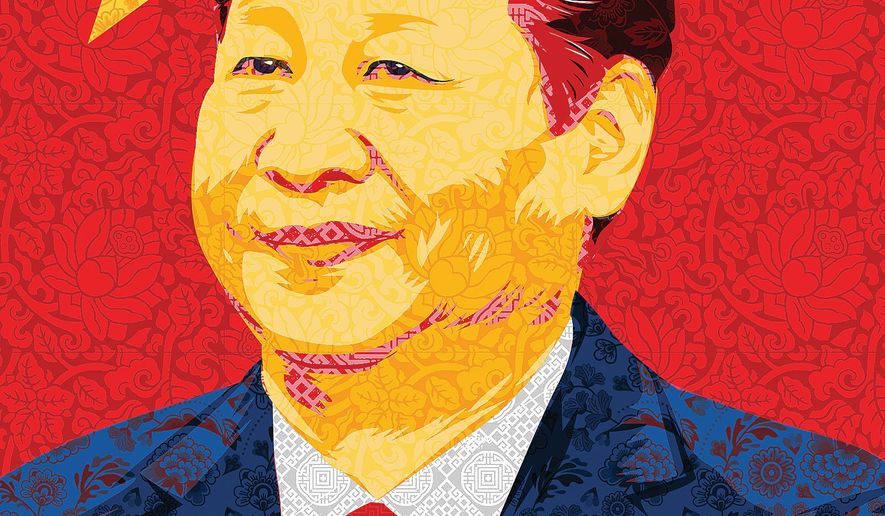OPINION:
Last fall, the Chinese Communist Party amended its charter to include “Xi Jinping Thought” as one of its elements. That move elevated Chinese President Xi Jinping to the same level as Mao Zedong, founder of the People’s Republic of China.
Mr. Xi, now at the end of his first five-year term in office, has engineered a proposed change to China’s constitution that will enable him to serve more than two terms, effectively making him president for life. The change will be rubber-stamped by the “National People’s Congress” meeting later this month.
Mr. Xi evidently plans to be as big an influence as Mao was. That’s a tall order, but he’s off to a fast start.
By winning a civil war and proclaiming a perpetual revolution, Mao changed post-feudal China into a communist state in 1949. Mao’s “reforms” began with enabling peasants to seize land resulting in the mass murder of landowners.
Mao’s communist “reforms,” coupled with his “Cultural Revolution” and other policies, probably killed 70 million people, more than Hitler, Stalin and Pol Pot combined.
Soviet communism was revolutionary in global the sense, requiring the conquest of neighbors and undermining any free nation wherever it could. Mao’s revolutionary communism was somewhat different, focused more internally and regionally — as in the Korean War — than globally. Mao’s successors wanted more. They recognized that great power military status had to be based on economic power.
The means of China’s rise to great power status was best charted by the early 1990s “24 Character” strategy of Deng Xiaoping.
That strategy provided that China should, “observe calmly; secure our position; cope with affairs calmly; hide our capacities and bide our time; be good at maintaining a low profile; and never claim leadership.” Pursuit of that strategy — quietly, stealthily and inexorably — has made today’s China enormously strong economically and militarily. To the (unjustifiable) surprise of many in the West, China is not only highly capable it is expansionist and militarily adventurous in and beyond its region.
The growth of its economic strength was accelerated by U.S. borrowing and U.S. and European companies’ investments in Chinese manufacturing.
Mr. Xi is more comfortable in exercising China’s power than many of his predecessors. He does so without following the falsely self-effacing manner of Mr. Deng’s “24 Character strategy.”
Mr. Xi has dealt with party corruption in much the same way as Saudi Crown Prince Mohammed bin Salman has. Combating corruption is a secondary effect of his campaign to consolidate power. Mr. Xi, however, has been more successful internally, increasing nationalistic sentiment on the strengths of China’s undeniable economic and military power.
China is no longer quiet about its military power or in trying seeking to conceal its leadership in the fields it believes it dominates. Mr. Xi has reformed China’s massive army, making it leaner and likely much more effective. China now brags about weapon systems such as its new J-20 stealth fighter. It has one aircraft carrier and is building more as well as long-range air-to-surface missiles aimed at denying US ships and aircraft access to the increasing amounts of sea and sky it claims.
Mr. Xi’s aggressive moves to establish military bases on newly-built islands in the South China Sea are accompanied by ever-bolder efforts to restrict U.S. ships and aircraft from their ever-expanding areas of control. China is engaged in the 21st century “great game” for the Middle East and Southwest Asia.
As U.S. Central Command boss Gen. Joseph Votel told a House committee last week, China and Russia are creating “multidimensional” ties to Iran, seeking to capitalize on perceived waning U.S. influence.
The “China-Pakistan Economic Corridor” is a “twofer” for China. China is building railroads across Pakistan as well as a large naval base being built on the Gulf of Oman near Gwadar. CPEC establishes Chinese power in Pakistan and enables it to exert pressure on India, the world’s largest democracy.
Mr. Xi’s ambitions are well-timed for two reasons. First, because they coincide with those of others of his ilk such as Russian President Vladimir Putin and Turkish President Recep Tayyip Erdogan. Second, because after decades of gluttonous U.S. domestic spending coupled with over 16 years of war, America is incapable of diplomatically or militarily thwarting most of the threats pose separately and together.
Two Fridays ago, President Trump sanctioned 28 Chinese-registered ships for violating trade restrictions with North Korea. Though his threats of a trade war with China are unclear and probably ill-advised, his administration gave a cold reception to Chinese politburo member Liu He last week. Those actions are thin gruel at best.
Mr. Xi is more powerful and bolder than all of his predecessors since Mao. Boldness needs to be answered in kind. Mr. Trump apparently wants to revive President George W. Bush’s 2003 “Proliferation Security Initiative,” which began with 11 nations promising to help stop ships carrying weapons of mass destruction and materials to make them.
If the revived PSI’s participants are willing to stop suspected Chinese-flagged ships carrying cargoes to and from North Korea, doing so would send a chilling message to Mr. Xi. That would be a small start in answering Mr. Xi’s threats. But it would be a start.
• Jed Babbin, a deputy undersecretary of defense in the George H.W. Bush administration, is the author of “In the Words of Our Enemies.”




Please read our comment policy before commenting.